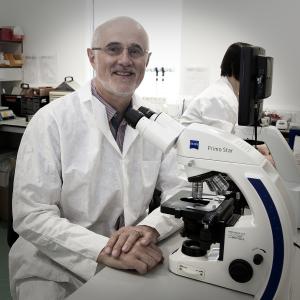Out of this world research to find new medicines welcomed by Manchester scientists
Scientists in Manchester welcome the decision by NASA to send fungus into space to try and create new drugs to help treat diseases like cancer and Alzheimer’s.
Professor Malcolm Richardson and his team at The University of Manchester say they are standing by to see if the month long experiment on the International Space Station using the fungus Aspergillus nidulans produces molecules capable of becoming potential medicines.
Professor Richardson, who is Professor of Medical Mycology, explains: “ This is exciting stuff. When fungi are put into stressful environments it can sometimes produce useful drugs, like penicillin. This fungus is known to produce drugs for osteoporosis and current research on earth suggests that it may produce molecules, which will help in studies to fight cancer, fungal diseases and Alzheimer’s.
“ Fellow researchers at the University of Southern California (USC) have found that when the fungi are put in stressful conditions, silent secondary metabolite pathways are turned on. The hope is that by sending the fungus to the International Space Station, the stressful environment (high radiation and microgravity) may prompt the Aspergillus nidulans to produce more molecules of the types we know of and others that aren’t made when on earth. Genetic analysis of the fungus has shown that it has the potential to produce 40 different types of drugs,” he adds.
As well as having wide-ranging uses back on Earth, being able to produce drugs in space is vital as humans spend longer periods of time in space. NASA’s human mission to Mars for example, is expected to last between one and three years – some drugs will not last this long. The development of self-sustaining drug production will enable man to go further away from Earth and spend longer in space.
Specimens sent from Cape Canaveral Air Force Station in Florida on Friday (April 8) and are due to return in early May.
For more information or for high resolution images please contact Susan Osborne, Director of Communications and The Goodwork Organisation on +44 (0)7836 229208
Notes to Editors
Malcolm Richardson is the Director of the Mycology Reference Centre at the University Hospital of South Manchester and an honorary Professor of Medical Mycology at The University of Manchester. He is a Fellow of the Royal College of Pathologists and of the Royal Society of Biology. His clinical and laboratory investigations have focused on the pathogenicity, diagnosis and epidemiology of superficial and systemic fungal infections. More recently he has applied his diagnostic experience to investigating the health impacts of environmental moulds in the built environment.
His current professional duties include being President of the International Society of Human and Animal Mycology (ISHAM) (2015 - 2018), and the President of the Institute of Specialist Surveyors and Engineers (2013 -). Malcolm Richardson acts as a consultant for the European Food Safety Authority and the World Health Authority, and is a senior advisor for the Global Action Fund for Fungal Infections whose vision is to reduce illness and deaths associated with fungal disease worldwide.
Susan Osborne
Goodwork, Director of Communications
+44 (0)208 747 1488
email us here
Legal Disclaimer:
EIN Presswire provides this news content "as is" without warranty of any kind. We do not accept any responsibility or liability for the accuracy, content, images, videos, licenses, completeness, legality, or reliability of the information contained in this article. If you have any complaints or copyright issues related to this article, kindly contact the author above.


